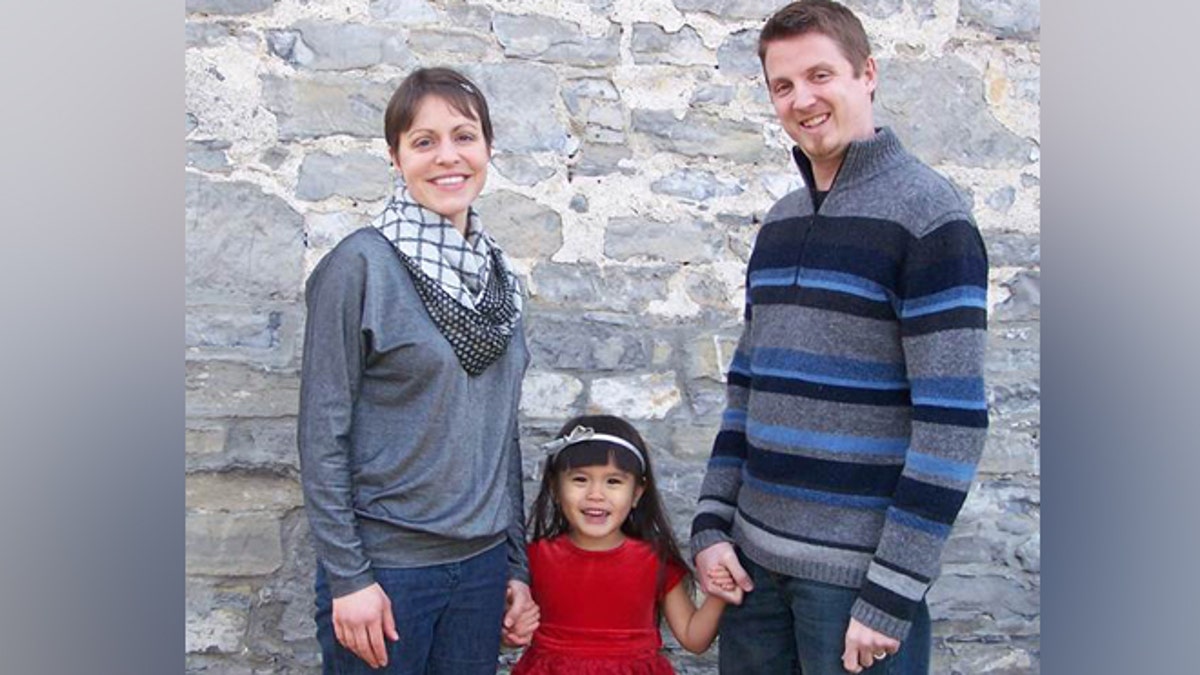
Stephanie and Ben Hawkins conceived their daughter using a donor embryo.
Stephanie Hawkins is one of the 6.7 million women in the U.S. who struggle with infertility. But when she and her husband Ben realized they wouldn’t be able to have biological children, the Rochester, NY couple decided it was time to try to start their family another way.
“[Using a sperm or egg donor] seemed like going outside of our marriage,” Hawkins, now 33, told FoxNews.com. “So we decided [a baby] will either be from both of us or…we’ll go the route of adoption.”
But instead of a traditional adoption, the couple decided to pursue another option: embryo donation – also sometimes referred to as embryo “adoption.”
When a woman undergoes in vitro fertilization (IVF), she freezes a number of embryos in order to achieve a successful pregnancy – sometimes those frozen embryos go unused for various reasons. Embryo donation refers to the process in which a woman chooses to donate unused IVF embryos– usually anonymously – to a clinic so another woman can have a child.
For people with leftover embryos, their options include donation, destroying the embryos, keeping them frozen or allowing them to be used for scientific research. For this reason, Stephanie and Ben felt embryo donation was not only a good option for their family – but also the “pro-life” thing to do.
“These embryos, rather than being discarded or thrown out like trash, or used to be researched on in some lab or just sitting indefinitely frozen in limbo…you’re giving them this chance at life, releasing them from their frozen state,” Hawkins said.
A unique way to start a family
To help them start their family, Stephanie and Ben chose Nightlight Christian Adoptions’ Snowflakes Embryo Adoption program, after receiving referrals from both a family friend and their obstetrician.
According to Kimberly Tyson, marketing and program director for Snowflakes Embryo Adoption, Nightlight chooses to employ the phrase embryo ‘adoption’ – as opposed to ‘donation’ – because the organization believes in utilizing practices common in traditional adoptions to match embryo donors with recipients.
Typically, embryo donations occur anonymously, requiring no contact between the donor and recipient, Dr. Paula Amato, the chair of the ethics committee of the American Society for Reproductive Medicine (ASRM) told FoxNews.com in an email.
The Snowflake Embryo Adoption program is unique in that it is one of a few clinics in the United States that allows the donor family to have a say in who receives their embryos – encouraging open communication between families after a donation results in a birth. Furthermore, recipients go through screening processes similar to those seen in adoption.
“We treat [donors] in this perspective like a woman with an unplanned pregnancy, though the comparison ends there,” Tyson told FoxNews.com. “A birth mother chooses which family she will place her children with, and we feel donor parents should have same ability to choose who their embryos go with.”
Controversies surrounding embryo donation and ‘adoption’
The legal status of embryos in the United States has long been a topic of debate. In fact, in 2006, Nightlight Christian Adoptions was drawn into the debate surrounding the ethics of using embryos for scientific research when President George W. Bush invited the families of ‘Snowflake’ children to attend an event in which he vetoed increased funding for embryonic stem cell research.
The term embryo ‘adoption’ is also controversial in the world of assisted reproductive technology.
In a paper from the ASRM’s Ethics Committee, the group states that, “Embryos are deserving of special respect, but they should not be afforded the same status as persons. Adoption refers to a specific legal procedure that establishes or transfers parentage of existing children. Application of the term ‘adoption’ to embryos is inaccurate, is misleading, and could place burdens upon infertile recipients and should be avoided.”
However, Tyson noted that while Nightlight utilizes the best practices of adoption for their embryo donations, they’re aware that embryo ‘adoption’ is nothing like traditional adoption from a legal standpoint.
“Everybody wants to know: Do you have to finalize in court like regular adoption?” Tyson said. “And the answer to that is ‘no’ because in the U.S. the woman who gives birth is considered the legal parent and the man she is married to is considered father unless they go to lengths to prove otherwise.”
A donation success story
Through Nightlight, Stephanie and Ben eventually matched with a donor. After going through the application process and a home study, the couple “adopted” the donor’s three leftover embryos – and in 2009, Stephanie gave birth to their daughter.
Stephanie and Ben have a good relationship with their donor family, and regularly exchange emails and pictures. They also agreed to a meeting between the two families when their daughter was 2 years old.
Overall, Stephanie said the process has been great and she would recommend it to other families.
“It’s a really cool thing that you’re doing, in the process you get to have your child or children but you’re also helping lives,” Hawkins said.
Tyson said she wishes more of the embryos that are simply destroyed or abandoned could be donated to other women seeking children. Furthermore, Nightlight works with all types of families to facilitate donations.
“We work with people of all faiths, no faiths…the LGBT community, we’ve worked with all of these groups,” Tyson said.
For more on Nightlight Christian Adoptions, visit Nightlight.org.
